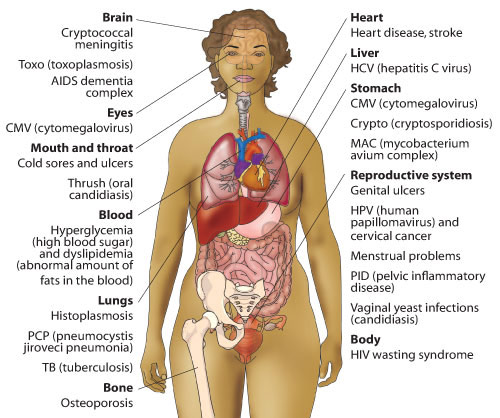Opportunistic infections and other conditions
People with HIV can develop opportunistic infections (OIs). These are infections that take advantage of weakness in the immune system. OIs also include certain types of cancer. Some OIs only affect women or affect women more than men. For example, certain female health problems, like yeast infections, are common to many women. For women with HIV, these problems are harder to treat and can be more serious. If you have HIV and develop one or more OIs, you might have AIDS. The good news is that there are ways to prevent and treat many OIs. If you have symptoms of an OI, talk to your doctor right away. Your treatment might change. The drugs or combination of drugs that work best are different depending on the infection.
Thanks to current treatments, people with HIV are living longer and many are able to avoid OIs and AIDS for a long time. However, this also means that people with HIV are at risk of developing the same conditions that others develop as they get older. These include heart disease, diabetes, high blood pressure, and osteoporosis. Recent research shows that certain types of cancer that are considered AIDS-defining conditions have decreased dramatically thanks to antiretroviral therapy. However, the research showed that rates of other types of cancer in people with HIV are going up, partly because people with HIV are living longer, but more research is needed to understand if there are other links between HIV and cancer.
Living longer is not the only thing that puts people with HIV at risk of other conditions. Apart from age, people with HIV are already almost twice as likely to have a heart attack. HIV therapy can cause dyslipidemia, an abnormal amount of fats in the blood. This can also increase the risk of diabetes in people with HIV. Plus, people with HIV are more prone to having bone loss than people who don't have HIV.
It is important to keep a healthy diet and exercise, and keep cholesterol and blood pressure under control, to prevent these problems. People with HIV may need to talk to their doctor about other ways to prevent these conditions as well as OIs and AIDS. You may need additional tests or medications that are not related to HIV. Keep up with your Pap tests as often as your doctor recommends, and do follow-up testing if you have an abnormal Pap result. Watch for other infections, too. If you have flu-like symptoms, call your doctor right away. Your doctor may recommend that you get a flu vaccine or others to prevent infection. People with HIV need to prevent from getting infections your body can't fight. Other vaccines, such as the measles vaccine, can be harmful to people with HIV. This type of vaccine contains live virus. In healthy people, the live virus prompts the body to make antibodies. But in people with HIV, this vaccine can make you sick. Talk to your doctor about what vaccines you need and what to avoid. Read more about recommended vaccines for women with health conditions.
Taking care of your health right away is the best way to maintain good health with HIV for a long time. These are the OIs that people with HIV need to watch for and work to prevent:
- AIDS dementia complex (ADC)
- Cryptococcal meningitis
- Cryptosporidiosis (crypto)
- Cytomegalovirus (CMV)
- Genital ulcers
- Hepatitis C virus (HCV)
- Histoplasmosis
- HIV wasting syndrome
- Human papillomavirus (HPV) and cervical cancer
- Menstrual problems
- Mouth problems
- Mycobacterium avium complex (MAC)
- Oral candidiasis (thrush)
- Pelvic inflammatory disease (PID)
- Pneumocystis jiroveci pneumonia (PCP)
- Toxoplasmosis (toxo)
- Tuberculosis (TB)
- Vaginal yeast infections

More information on opportunistic infections and other conditions
Explore other publications and websites
-
HIV: How to Avoid Infections When You Have HIV (Copyright © American Academy of Family Physicians) — This fact sheet discusses ways to protect yourself from other infections if you are HIV-positive. It also discusses precautions in regards to pets, travel, food, and water.
http://familydoctor.org/online/famdocen/home/common/sexinfections/hiv/248.html
-
Opportunistic Infections — Use this Web page to search for information on opportunistic infections that can affect for people living with HIV/AIDS.
http://aidsinfo.nih.gov/HealthTopics/HealthTopicDetails.aspx?id=53&s=74
-
Recommended Immunizations for HIV Positive Adults — This document lists immunizations that are recommended for adults with HIV in order to avoid opportunistic infections.
http://aidsinfo.nih.gov/ContentFiles/Recommended_Immunizations_FS_en.pdf
-
Safe Food and Water: A Guide for People With HIV Infection — This publication explains how people with HIV can prevent infection through safe food and water preparation.
http://www.cdc.gov/hiv/pubs/brochure/food.htm
-
Strategies for Managing Opportunistic Infections (Copyright © Project Inform) — This publication gives information on preventing and treating opportunistic infections.
http://www.projectinform.org/publications/ois/
Connect with other organizations
-
AIDS.gov
http://www.aids.gov/
-
AIDSinfo
http://aidsinfo.nih.gov/
-
Division of Acquired Immunodeficiency Syndrome, NIAID, NIH, HHS
http://www.niaid.nih.gov/about/organization/daids/Pages/default.aspx
-
Divisions of HIV/AIDS Prevention, CDC, HHS
http://www.cdc.gov/hiv/dhap.htm
-
HIV/AIDS Programs, HRSA, HHS
http://hab.hrsa.gov/
Content last updated July 1, 2011.
Resources last updated July 1, 2011.
womenshealth.gov
A federal government website managed by the Office on Women's Health in the Office of the Assistant Secretary for Health at the U.S. Department of Health and Human Services.
200 Independence Avenue, S.W. • Washington, DC 20201


 Text size
Text size Email
Email
